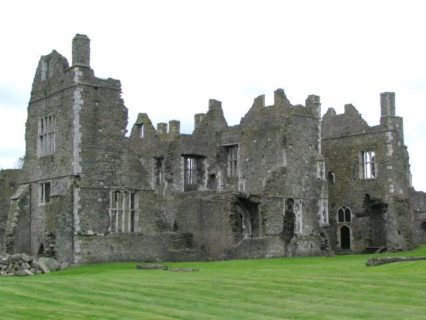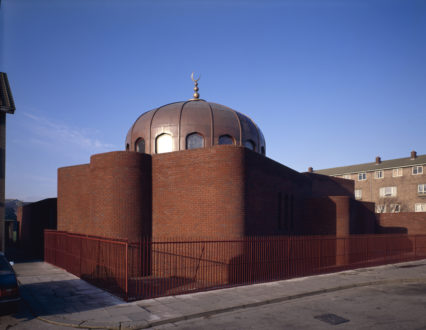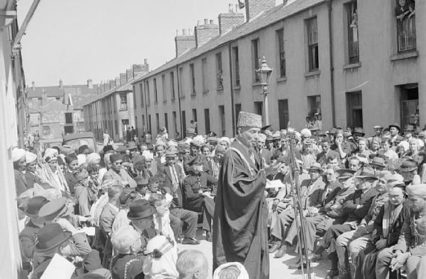As Ramadan begins, Delyth Jewell AC/AM writes on the history of Islam in Wales, and asks for more to be done to commemorate the contributions of Muslim communities to Welsh culture.
This Sunday evening, 5th of May, marks the beginning of Ramadan. Ramadan (the month of the Qur’an) is the ninth month of the Islamic calendar and is one of the most important times of the year for Muslims. Almost all adult Muslims will fast during Ramadan from after their pre-dawn meal (suhoor) until they break their fast with an evening meal (iftar) at sunset. It is also believed that the Qur’an was first revealed to the Prophet Muhammad on the night of Lailat ul Qadr during the holy month of Ramadan.
Wales in particular boasts a rich Muslim population with Islam being the largest non-Christian faith in Wales. Our Welsh-Muslim heritage is rich and vast with the earliest recorded history dating all the way back to the early 12th century.

Dr Abdul-Azim Ahmed of On Religion suggests in his fascinating piece on a Brief History of Muslims in Wales that the 12th century Neath Abbey may have been designed by a Muslim when Lalys was brought to Britain as a captive from Palestine by Richard de Granville. As Dr Ahmed eloquently puts it, “Neath Abbey symbolises the cultural exchange and communication that occurred between Muslims and Christians through trade and travel”.
The first mosque in Wales was built in our capital in 1947. Wales now proudly houses forty mosques nation-wide. Cardiff alone is home to at least eighteen mosques – including the South Wales Islamic Centre in Butetown and ones for Somali, Bangladeshi and Pakistani communities. Newport has seven mosques and in north Wales there are ongoing plans to renovate an old chapel in Llanbedr into a brand new mosque.
One of the most brilliant things about Cardiff is the fact that is has been home to the oldest black and Muslim communities in the UK with its roots dating back to the mid-19th century. The Somali and Yemeni seamen’s history in Wales begins with the ‘first wave’ of Somali migrants who arrived in the docks of Cardiff, Barry and Newport after the opening of the Suez Canal in 1860. Somalia, of course, was colonised by the British Empire during the 19thcentury. Somali (and Yemeni) merchant navy men would travel on steamships from their home countries transporting Welsh coal around the world. Hundreds ended up settling in Wales and many Cardiff families can trace their family history back to the first seamen who settled in Wales.
But there is so much we still don’t know.
There is a quiet self-awareness amongst us in Wales when it comes to our history. We know we must not forget it so we hold it tight and pass it on. Like the recent phenomenon when Cofiwch Dryweryn was spray-painted over and over again across the four corners of Wales, we know that an understanding of our own national history is integral to our identity and our future as a people.
But let us also say then, Cofiwch Tiger Bay, too. Cofiwch the Muslim Somali and Yemeni seamen of Cardiff docks. Cofiwch the history of Muslims in Wales – the stories, the songs, the secrets.

As an Assembly Member, my work takes me to our Senedd, the Welsh Parliament, in the heart of Cardiff Bay – to the north of Tiger Bay and to the south of Butetown – a stone’s throw but a world away. The Muslim communities of Wales have made a crucial and integral contribution to Welsh history and public life and we should be proud of the part they have played in the development of our cities – Cardiff, Swansea, Newport and Bangor. This cannot be forgotten nor hidden.
Therefore, given the history of Islam in Wales, what’s stopping us from campaigning to have a large memorial statue built in the heart of Cardiff Bay to commemorate the Islamic Somali and Yemeni seamen who set the foundations for our capital city all those years ago, and to build it together with the Muslim communities of Cardiff?
It would certainly be a start to acknowledging the right history of Muslims in Wales and perhaps there is no better time, then, than this holy Islamic month to reflect, recognise, discuss and celebrate the incredible contribution of Muslims in Wales.
Ramadan Mubarak to all Muslims everywhere. May this Ramadan be as bright as ever.
Ramadan: Islam in Wales is written by Delyth Jewell, who is a Plaid Cymru AM and Shadow Minister for Culture.











